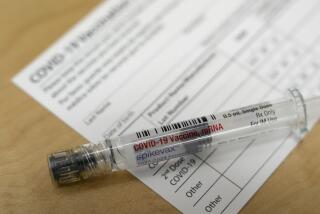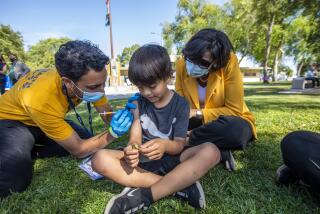CDC Says Flu Shot Needs Will Be Met
- Share via
Spot shortages of flu vaccine have developed around the country as people alarmed by the bird flu have flocked to clinics in large numbers, but government officials said Thursday that they were expecting near-record vaccine production and should have enough for everyone who wants a shot.
Furthermore, the flu season has started off very slowly with “sporadic or no flu activity in many states,” said Dr. Julie Gerberding, director of the Centers for Disease Control and Prevention.
“We expect many more doses of vaccine, and there is plenty of time to get immunized,” she said in a news conference Thursday. The flu season generally peaks in February and March.
So far, 71 million doses of vaccine have been distributed by the four manufacturers who supply the U.S. market. Gerberding said she expected the eventual total to be at least 81 million doses.
Gerberding said all the pediatric doses of the vaccine have been distributed, and there were no reports of shortages.
Although interest in the vaccine has been stimulated by reports about bird flu, officials emphasized that the vaccine now in use provides no protection against bird flu. Furthermore, the bird flu has been restricted primarily to birds, although world health officials fear that a mutation could lead to a pandemic in humans.
CDC officials had hoped to immunize 100 million people last year, but the vaccine supply was cut in half when one of the major manufacturers, Chiron Corp., was forced to destroy its supply because of contamination.
News reports in recent days have suggested shortages this year in some locations. Kaiser Permanente in Northern California shut down its vaccination clinics Wednesday when it ran out of vaccine. Grocery chains in the South, such as Winn-Dixie, have also been forced to halt their vaccination programs, and clinics in Arizona have had supply problems.
The American Public Health Assn. in Washington, D.C., had to cancel its flu shot program for employees because they couldn’t get vaccine, said Dr. Georges C. Benjamin, the group’s executive director.
In Southern California, there do not appear to be any shortages. Dr. Edith Mirzaian, clinical coordinator of pharmacies at USC, said the university had an initial delay in getting the vaccine, but now “there is plenty to go around.” Local pharmacies, grocery chains and clinics should have all they need, she said.
Dr. David Pegues, hospital epidemiologist at UCLA, echoed Mirzaian’s comments. “We’re administering the vaccine to everyone who wants it,” he said.
More to Read
Sign up for Essential California
The most important California stories and recommendations in your inbox every morning.
You may occasionally receive promotional content from the Los Angeles Times.













